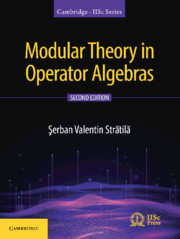Book contents
- Frontmatter
- Dedication
- Contents
- Preface to the Second Edition
- Preface to the First Edition
- Chapter I Normal Weights
- Chapter II Conditional Expectations and Operator-Valued Weights
- Chapter III Groups of Automorphisms
- Chapter IV Crossed Products
- Chapter V Continuous Decompositions
- Chapter VI Discrete Decompositions
- Appendix
- References
- Notation Index
- Subject Index
Appendix
Published online by Cambridge University Press: 16 October 2020
- Frontmatter
- Dedication
- Contents
- Preface to the Second Edition
- Preface to the First Edition
- Chapter I Normal Weights
- Chapter II Conditional Expectations and Operator-Valued Weights
- Chapter III Groups of Automorphisms
- Chapter IV Crossed Products
- Chapter V Continuous Decompositions
- Chapter VI Discrete Decompositions
- Appendix
- References
- Notation Index
- Subject Index
Summary
In this section, we review some facts used in the main text concerning positive self-adjoint operators in Hilbert spaces, W-algebras and infinite tensor products. Throughout this section, will denote a complex Hilbert space.
Let A be a positive self-adjoint linear operator on with domain. For each, we put (see [L], 9.9) and for each, we define ; note that. From ([L], 9.9–9.11) we see, using Lebesgue's dominated convergence theorem, that a vector belongs to if and only if
if, then we put, so that the above limit gives for any vector
Recall ([L], 9.20) that the restriction of A to is the analytic generator of the so-continuous unitary representation; the operators can be also regarded as partial isometries acting on the whole of.
Let a be a subset of. A continuous function is said to be operator continuous if the mapping
is continuous with respect to the so-topology and the s-topology.
Theorem (I. Kaplansky, R. V. Kadison). Let be such that and let be a continuous function such that. Then f is operator continuous.
Proof. We first prove the theorem for. Note that the functions and are operator continuous on. Indeed, if are normal operators such that and, then
A similar argument holds for the s-topology.
Denote by the set of all operator continuous functions on and by the subset of bounded functions in. Then is a uniformly closed self-adjoint vector subspace of the *-algebra of all continuous complex functions on and. Hence is a uniformly closed *-subalgebra containing the functions and. By the Stone–Weierstrass theorem, it follows that contains the *-subalgebra of continuous complex functions vanishing at infinity on. Let be a continuous function such that sup. Then belongs to and since it follows that belongs to (actually to), so that belongs to and we conclude that f, as a sum of two functions in, also belongs to.
Consider now the general case. Let be normal operators with Sp(xi) and Sp(x) contained in and. Since, there exists a compact neighborhood of such that. Then, hence is closed in and, by the Tietze– Urysohn extension theorem, f can be extended to a continuous function g on. Let be a continuous function such that supp and.
- Type
- Chapter
- Information
- Modular Theory in Operator Algebras , pp. 415 - 428Publisher: Cambridge University PressPrint publication year: 2020

